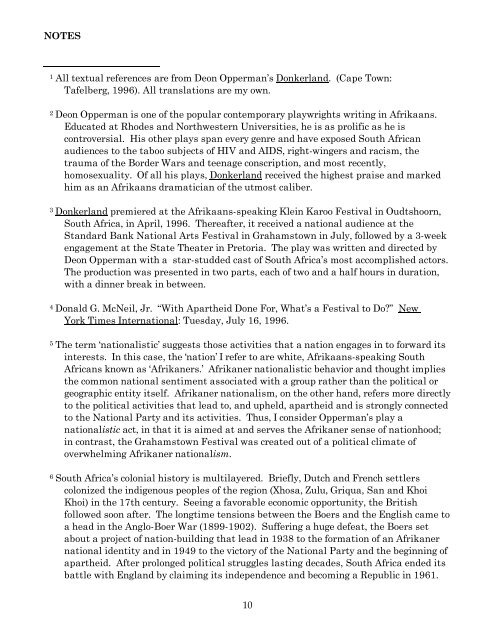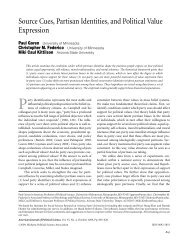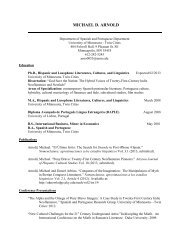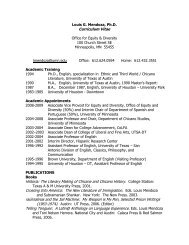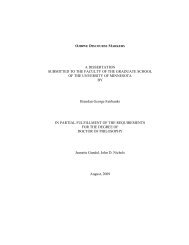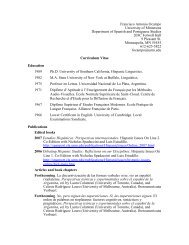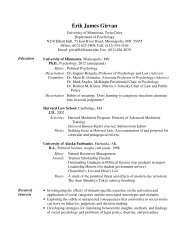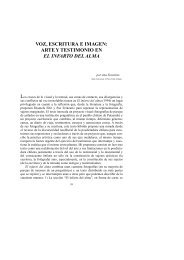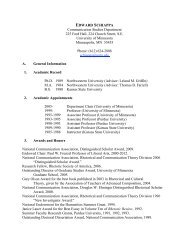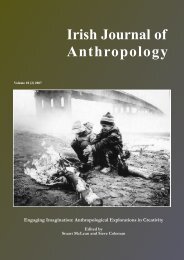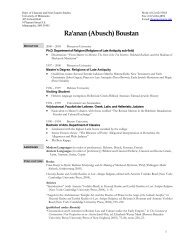De/Re-Constructing Borders - University of Minnesota
De/Re-Constructing Borders - University of Minnesota
De/Re-Constructing Borders - University of Minnesota
You also want an ePaper? Increase the reach of your titles
YUMPU automatically turns print PDFs into web optimized ePapers that Google loves.
NOTES<br />
1 All textual references are from <strong>De</strong>on Opperman’s Donkerland. (Cape Town:<br />
Tafelberg, 1996). All translations are my own.<br />
2 <strong>De</strong>on Opperman is one <strong>of</strong> the popular contemporary playwrights writing in Afrikaans.<br />
Educated at Rhodes and Northwestern Universities, he is as prolific as he is<br />
controversial. His other plays span every genre and have exposed South African<br />
audiences to the taboo subjects <strong>of</strong> HIV and AIDS, right-wingers and racism, the<br />
trauma <strong>of</strong> the Border Wars and teenage conscription, and most recently,<br />
homosexuality. Of all his plays, Donkerland received the highest praise and marked<br />
him as an Afrikaans dramatician <strong>of</strong> the utmost caliber.<br />
3 Donkerland premiered at the Afrikaans-speaking Klein Karoo Festival in Oudtshoorn,<br />
South Africa, in April, 1996. Thereafter, it received a national audience at the<br />
Standard Bank National Arts Festival in Grahamstown in July, followed by a 3-week<br />
engagement at the State Theater in Pretoria. The play was written and directed by<br />
<strong>De</strong>on Opperman with a star-studded cast <strong>of</strong> South Africa’s most accomplished actors.<br />
The production was presented in two parts, each <strong>of</strong> two and a half hours in duration,<br />
with a dinner break in between.<br />
4 Donald G. McNeil, Jr. “With Apartheid Done For, What’s a Festival to Do?” New<br />
York Times International: Tuesday, July 16, 1996.<br />
5 The term ‘nationalistic’ suggests those activities that a nation engages in to forward its<br />
interests. In this case, the ‘nation’ I refer to are white, Afrikaans-speaking South<br />
Africans known as ‘Afrikaners.’ Afrikaner nationalistic behavior and thought implies<br />
the common national sentiment associated with a group rather than the political or<br />
geographic entity itself. Afrikaner nationalism, on the other hand, refers more directly<br />
to the political activities that lead to, and upheld, apartheid and is strongly connected<br />
to the National Party and its activities. Thus, I consider Opperman’s play a<br />
nationalistic act, in that it is aimed at and serves the Afrikaner sense <strong>of</strong> nationhood;<br />
in contrast, the Grahamstown Festival was created out <strong>of</strong> a political climate <strong>of</strong><br />
overwhelming Afrikaner nationalism.<br />
6 South Africa’s colonial history is multilayered. Briefly, Dutch and French settlers<br />
colonized the indigenous peoples <strong>of</strong> the region (Xhosa, Zulu, Griqua, San and Khoi<br />
Khoi) in the 17th century. Seeing a favorable economic opportunity, the British<br />
followed soon after. The longtime tensions between the Boers and the English came to<br />
a head in the Anglo-Boer War (1899-1902). Suffering a huge defeat, the Boers set<br />
about a project <strong>of</strong> nation-building that lead in 1938 to the formation <strong>of</strong> an Afrikaner<br />
national identity and in 1949 to the victory <strong>of</strong> the National Party and the beginning <strong>of</strong><br />
apartheid. After prolonged political struggles lasting decades, South Africa ended its<br />
battle with England by claiming its independence and becoming a <strong>Re</strong>public in 1961.<br />
10


